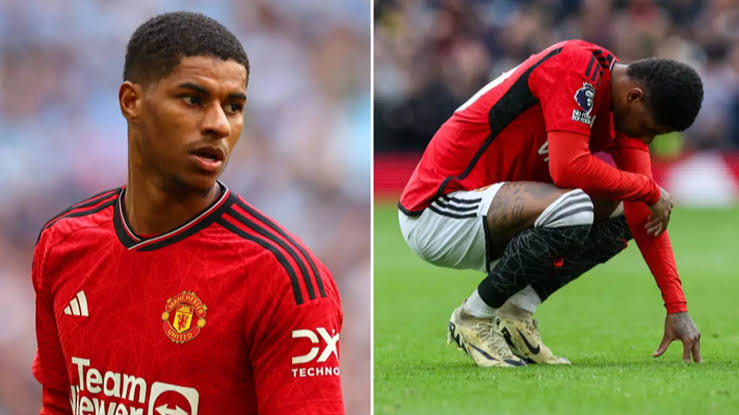Marcus Rashford, once hailed as Manchester United’s golden boy and a beacon of hope both on and off the pitch, now finds himself at the center of a storm that’s dividing fans, pundits, and football experts alike. From scoring crucial goals to spearheading social causes, Rashford has been the darling of English football. But this season, his performances have been far from the standard expected of a player who was once seen as the future of Manchester United. Has Rashford lost his luster, or is this just a bump in the road for a player under immense pressure?
A Steep Decline in Form
Rashford’s recent displays have been characterized by inconsistency, missed opportunities, and a lack of urgency. His body language on the field has often appeared lackluster, prompting critics to question his commitment. Once known for his blistering pace, directness, and killer instinct in front of goal, Rashford now seems hesitant, lacking the spark that made him a nightmare for defenders. His poor decision-making and frequent drifts out of games have frustrated even his staunchest supporters.
Statistically, the decline is evident. Compared to his peak seasons, his goal and assist tallies have taken a nosedive. Despite his obvious talent, Rashford has failed to rise to the occasion when his team needs him most, contributing to United’s ongoing struggles in the Premier League and Europe. With every missed chance and underwhelming performance, the murmurs grow louder: is Rashford’s place in the starting XI still justified?
Off-Pitch Distractions: A Double-Edged Sword?
Rashford’s off-pitch endeavors, particularly his activism against child hunger and poverty, have rightly earned him plaudits and a Member of the Order of the British Empire (MBE) award. However, there’s a growing sentiment that his off-field commitments may be affecting his on-field performances. Critics argue that Rashford’s focus has been split between his social work and football, leading to questions about whether he still has the hunger and drive to succeed at the highest level of the sport.
Rashford’s defenders would counter that his charity work has nothing to do with his performances, emphasizing that a footballer can be dedicated to social causes without compromising his professional duties. However, football is a results-driven sport, and when performances dip, excuses are thin on the ground.
Tactical Misfits and Managerial Changes
Under successive Manchester United managers, Rashford has often been shifted around in various attacking roles, never quite settling into one position. His struggles have been exacerbated by tactical mismatches, a lack of consistent support from teammates, and a system that seems ill-suited to his strengths. It’s hard to pinpoint if Rashford’s decline is solely his fault or a result of being played out of position and failing to adjust to new tactical demands.
While the managerial upheaval at Old Trafford has undoubtedly affected the squad, Rashford’s failure to adapt and thrive under different coaches raises questions about his footballing intelligence and willingness to evolve. His tactical indiscipline has been a glaring issue, with his defensive work rate often criticized as subpar. Simply put, Rashford doesn’t look like the player who was once United’s most reliable match-winner.
Entitlement or Exhaustion?
There’s also an argument that Rashford may have fallen victim to his own success at a young age. With his meteoric rise came endorsements, accolades, and a reputation that was hard to live up to. Some critics argue that Rashford has become too comfortable, failing to put in the extra effort required to remain at the top level. His languid performances have led to accusations of complacency, with many believing he now carries an air of entitlement rather than the hunger of a player still proving himself.
Others believe that the relentless schedule, constant scrutiny, and pressure of carrying Manchester United’s hopes have taken a toll on the young star, leaving him exhausted physically and mentally. His struggles could be symptomatic of burnout rather than a permanent decline, raising the question of whether he needs a break or a new environment to rediscover his passion.
The Road Ahead: Redemption or Regression?
So, what does the future hold for Marcus Rashford? Is this just a temporary slump, or are we witnessing the beginning of a steep decline for a player who once seemed destined for greatness? For Rashford, the next few months could be career-defining. He must find a way to adapt, rediscover his form, and prove that he still has the drive to be the star Manchester United and England need.
Rashford’s tale is a cautionary one: a reminder that the footballing world is quick to crown heroes and even quicker to discard them when they fail to deliver. If he’s to avoid being another “what could have been” story, Rashford must show that he’s more than just a one-season wonder or a feel-good figure off the pitch. He needs to reignite the fire that made him a symbol of hope and a terror to opposing teams.
Whether Rashford can weather this storm and emerge stronger is the real test of his character and his future at the highest level of football. For now, though, the question lingers: has Manchester United’s golden boy lost his luster, or is the best of Marcus Rashford still to come?
